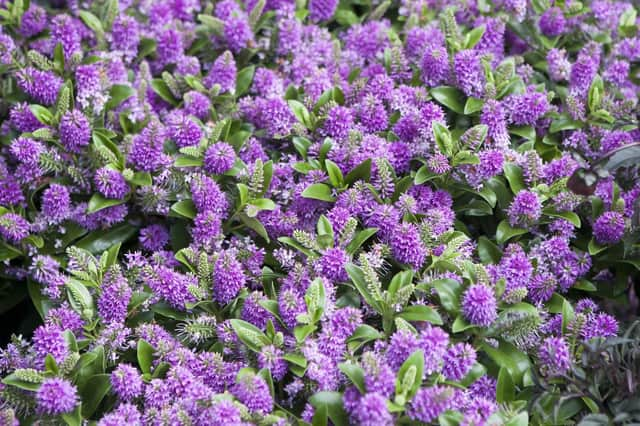GARDENING: Shortage of bees? Not in my garden says Brian Kidd


I can't understand this because the garden is buzzing with hundreds of  bees, hoverflies and a lot of butterflies I don't know the name of .
Perhaps the best way of attracting them is to grow a wide range of different types of plants which will produce flowers for a long period of time.
Advertisement
Hide AdAdvertisement
Hide AdThere are quite a few weeds in the garden because we can't do as many things as we used to. There was a time when I would do the weeding daily.
But back to bees'¦
I think the answer lies in the plants we grow. Some wild flowers are very useful to bees because the flowers produce nectar and pollen and it is always lovely to see a swathe of wild flowers.
We are most fortunate in having three different species of wild orchids including the purple marsh orchid which arrived all by itself.
Single flowers have the most pollen. Bees are very fond of hebe, an evergreen shrub we love very much. When I was an apprentice, the hebes died every seven years. It seems they have either got hardier or the winters have got warmer.
Advertisement
Hide AdAdvertisement
Hide AdIt's amazing because last winter was one of the coldest in living memory. I am comparing it to 1962 when the trees in Reading College froze. As students we had to fell dead trees to feed the boiler so we could keep warm. Yes, the hebes died that year.
But here at Waterlooville our hebes survived that bitter last winter and there are loads of bees on all the flowers.
All the so-called experts tell us that buddleia attract butterflies; indeed they are nicknamed the butterfly bush. If you don't have room for one, try some lovely lavender '“ there are dozens of bees on ours as I write and when we went to the garden centre last Friday, I counted 35 bees on a batch of plants which were in full bloom.
Single flowers in bloom right now? Have a look at cosmea. This single flowering plant is a sheer delight and is available at all good garden centres. It blooms all through the summer (Keydell nurseries at Horndean have hundreds of them). Just watch bees and butterflies arrive after you've planted cosmea.
Advertisement
Hide AdAdvertisement
Hide AdIf you would like the butterflies to come back again for another delectable treat of pollen and nectar, plant a clump of golden rod '“Â a very common plant, but our garden would not be the same without it.
I have also been really impressed by campanula Anna Lodden. This amazing plant is simply full of flowers and dozens of bees.
Meanwhile, on an allotment near mine, there are hundreds of butteries and hoverflies on a lovely swathe of Californian poppies. What a wonderful show '“ full of butterflies.
Take a look at your runner beans. Are the beans forming?
Yes!
That was down to the bees.
Perhaps you were still in bed when they came into the garden.
THIS WEEK'S TOP TIP
Sow large-rooted radish. Do it now and they'll be ready to add to those winter stews.